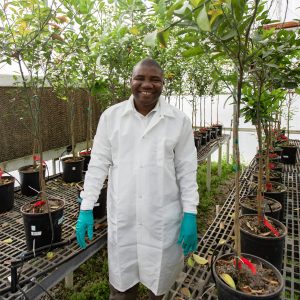Citrus is one of the most economically significant crops globally, and Florida plays a pivotal role in this industry. However, organic citrus farming presents unique hurdles that growers in Florida, Texas, and other southern states know all too well. Poor soil quality, nutrient deficiencies, and a limited range of pest control options have long plagued organic citrus production.

Dr. Davie Kadyampakeni, associate professor of citrus water and nutrient management, is poised to transform the future of organic citrus farming. He works in the UF/IFAS Department of Soil, Water, and Ecosystem Sciences. He conducts his research at the Citrus Research and Education Center in Lake Alfred. With new funding from the USDA-NIFA’s Organic Agriculture Research and Extension Initiative (OREI), this project aims to address some of the challenges facing organic citrus growers.
“Our long-term goal is to improve organic citrus production and sustainability through enhanced soil health, horticultural, and pest management practices,” Kadyampakeni said. “And ultimately, this should improve fruit yield.”
The team includes UF/IFAS colleagues at the North Florida and Southwest Florida Research and Education Centers. They also have a partner at Texas A&M University Kingsville. The group will work closely with organic citrus growers. Their focus is on enhancing soil health, increasing efficiency, and managing pests, while maintaining the core values of organic farming.
Healthier Soils and Combatting Pests
One component of the research is the use of cover crops, which can dramatically improve soil health by fixing nitrogen, suppressing weeds, and boosting microbial diversity.
“Cover crops not only help minimize or eliminate the need for synthetic herbicides, but they also foster an agroecology that naturally manages pests and diseases,” Kadyampakeni explained.
The team will explore different combinations of cover crops and organic soil amendments like compost and biochar. This will build the soil’s carbon and nitrogen content, which should result in healthier trees and higher fruit yields. By comparing their effects on soil health, nutrient availability, and fruit yield, the researchers aim to identify the best strategies for improving productivity.
In Florida, the threat of the Asian Citrus Psyllid (ACP)—the vector responsible for the devastating citrus greening disease—looms large. Conventional citrus farmers have a range of pest control options, but organic growers are often limited. A possible solution is integrating biological controls, such as cover crops, that promote natural predators like ladybeetles and lacewings.
“Our aim is to use nature itself to reduce reliance on synthetic pesticides and create a sustainable ecosystem where beneficial insects thrive,” Kadyampakeni noted.
Another bio-defense option is the parasitoid wasp (Tamarixia radiata), a natural enemy of the ACP. The researchers will test how cover crops and soil amendments can support the establishment of these beneficial predators, enhancing their impact on pest populations.
Engaging with Growers
While UF/IFAS and Texas A&M University- Kingsville researchers are partnering on this project, they also are collaborating with local growers.
“Stakeholder engagement is central to our approach,” Kadyampakeni said. “We’ve been working closely with organic citrus growers in Florida and Texas to understand their specific needs and challenges. They have expressed strong support for the project.”
The research findings will not just stay in the laboratory or test fields. The duration of the study will involve growers, with on-farm experiments planned across multiple states. The team will also conduct workshops and field days to share the knowledge gained from this research with the citrus farming community. The team expects the implementation of lessons learned will lead to greater sustainability and profitability for organic farmers.
“Our research should show that healthier soils, better pest management, and innovative practices can significantly increase organic fruit yields, making the industry more resilient to climate change and environmental challenges,” Kadyampakeni said.
They expect this project to improve the efficiency of organic citrus farming by reducing the need for synthetic inputs, lowering greenhouse gas emissions, and enhancing the overall health of the ecosystem. This is an important step toward a future where organic farming is not only sustainable but also economically viable.
Organic Farming’s Future
Dr. Kadyampakeni’s research project is an ambitious effort to tackle critical issues in organic citrus production today. By focusing on soil health, natural pest control, and stakeholder engagement, this research could redefine how U.S. producers grow citrus organically for decades to come.
As he envisions it, “This project isn’t just about improving citrus production. It’s about creating a sustainable future for organic farming, where both the environment and farmers can thrive.”
The “Sustainable Organic Citrus Production Using Improved Agroecological Management Strategies” research project is slated to run for the next four years. The federal grant that supports the work totals nearly $2 million.
This work is supported by the Organic Agriculture Program’s Organic Agriculture Research and Extension Initiative, project award no. FLA-CRC-006530, from the U.S. Department of Agriculture’s National Institute of Food and Agriculture.
Any opinions, findings, conclusions, or recommendations expressed in this publication are those of the author(s) and should not be construed to represent any official USDA or U.S. Government determination or policy.
 0
0
